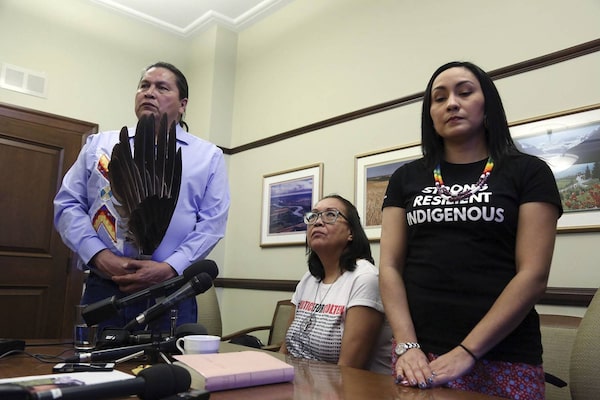
From left, Colten Boushie's uncle, Alvin Baptiste, his mother, Debbie Baptiste, and cousin Jade Tootoosis speak to the media after meeting with government officials in Ottawa on Feb. 12, 2018, in Ottawa.Dave Chan/The Globe and Mail
The federal government is promising to examine the way juries are chosen after the acquittal of a white Saskatchewan farmer, charged in the killing of a young First Nations man, by a jury that appeared to have been selected to exclude Indigenous people.
Three members of Colten Boushie's family travelled to Ottawa on Monday to talk to Liberal cabinet ministers about the injustices they say they have experienced since Mr. Boushie, a 22-year-old Cree man, was killed in August, 2016. Their trip followed a weekend of protests and expressions of outrage by First Nations leaders and others after Gerald Stanley, who held the gun that killed Mr. Boushie, was found not guilty Friday on charges of second-degree murder.
Mr. Boushie's mother, Debbie Baptiste, her brother, Alvin, and Mr. Boushie's cousin Jade Tootoosis met for four hours in the morning with the two federal ministers responsible for Indigenous affairs. They told reporters afterward that their aim was to establish relationships, not to ask for specific changes. But, they said, they did broach the issue of jury selection with the ministers.
Colten Boushie and beyond: A primer on the aftermath of Gerald Stanley's acquittal
Read more: What you need to know about juries, challenges and potential reforms
Colten Boushie's family is meeting with ministers following the acquittal of the Saskatchewan farmer charged in his death. Cousin Jade Tootoosis says her family wants to build relationships with people in Ottawa who can make a difference.
The Canadian Press
Prime Minister Justin Trudeau, who will meet with the Boushie family on Tuesday and sent "love" to them via Twitter on the day the verdict was announced, told the House of Commons on Monday afternoon that systemic issues must be addressed to make things more fair for Indigenous people and suggested an overhaul would include revising the system for selecting jurors.
"When Indigenous Canadians are significantly underrepresented on juries and in jury selection pools, we have a problem," Mr. Trudeau said. "We have much we need to do together to fix this system in the spirit of reconciliation and that's exactly what we're going to be doing."
Justice Minister Jody Wilson-Raybould, who tweeted after the verdict that "I truly feel your pain and I hear all of your voices," said Monday that she has already had conversations about the underrepresentation of Indigenous people on juries.
"We had reflected a bit, and will continue to, on jury selections, on peremptory challenges" that allow lawyers to object to potential jurors and have them removed from the jury pool without giving a reason, Ms. Wilson-Raybould said. "It is definitely something that we will look into."
Mr. Boushie was shot at close range in the back of the head with a semi-automatic handgun during a chaotic episode that began when he and four friends drove an SUV onto the Stanley farm on Aug. 9, 2016.
Mr. Stanley acknowledged in court that he caused Mr. Boushie's death but said he thought his gun was empty. He said it just went off accidentally in the melee that ensued after he believed Mr. Boushie's companions were trying to steal his ATV.
The Boushie family says Mr. Stanley's defence team used peremptory challenges to dismiss the five people in a 45-member jury pool who appeared to be Indigenous. It is an issue they said they hope to raise with Ms. Raybould-Wilson and Public Safety Minister Ralph Goodale when they meet with them on Tuesday.
"That's an issue that is a quick legislative fix," Chris Murphy, the Boushie family's lawyer, said of removing the ability to make peremptory challenges. "Everybody wants an impartial jury," Mr. Murphy said, "but there are a lot better to determine partiality or bias than looking at a person's skin. So let's change it."
Ms. Baptiste said the way to obtain justice for her son would be to remove racism from the system that acquitted Mr. Stanley. Her wish, she said, is that "Canada could come together, all its people could come together, and realize that we are all human beings and we've just got to break those barriers where we no longer [take account of] the dark skin, the white skin, the more privileged."
Carolyn Bennett, the Minister of Crown-Indigenous Relations, said Ms. Baptiste and the others made it clear during their meeting on Monday that their anger is not directed solely at the verdict. They did not feel justice was being done "from the very beginning in terms of investigations, in terms of the way that they were made to feel about the process," Dr. Bennett said.
Jane Philpott, the Minister of Indigenous Services, concurred with that. "They had concerns about the whole process, not just what's taken place in the last couple of days," she said.
The House of Commons unanimously agreed to spend part of Wednesday debating the experience of Indigenous people in the justice system.
There are divided views about the verdict. A fundraising campaign for Mr. Stanley topped $100,000 on Monday afternoon.
Reporters asked Ms. Wilson-Raybould whether she was questioning Mr. Stanley's acquittal in her tweet when she said "as a country, we can and must do better." She replied that she was merely reacting to the anguish that she said was being expressed on television and confirming her commitment "to work hard for justice for all Canadians."